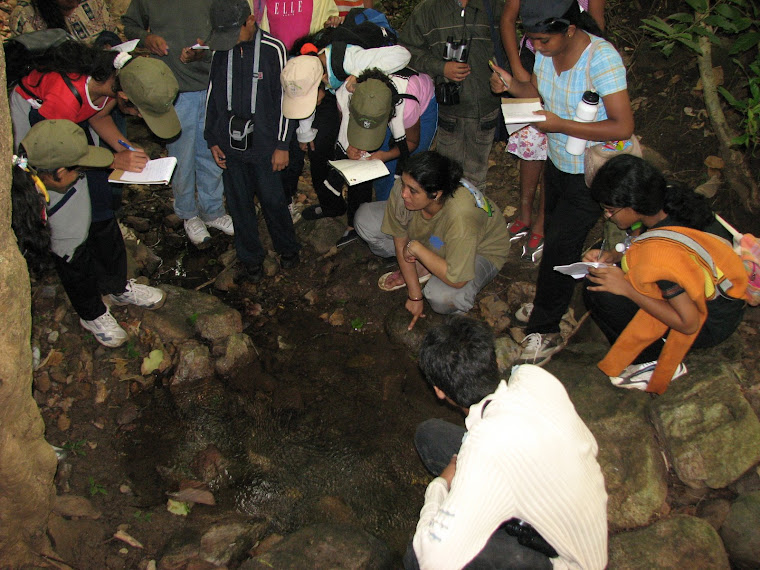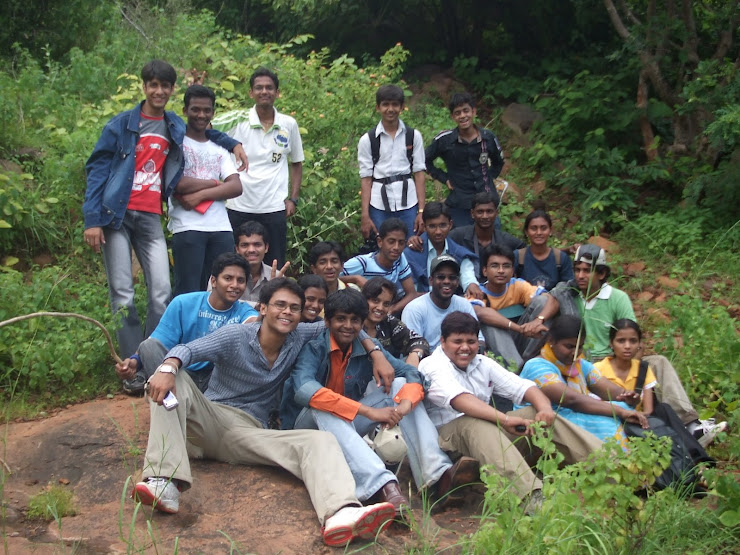A Nature Magnum Opus: Papi Hills..
(Organised by WWF-India, APSO and Bhartiya Vidhya Bhavans School)
(Supported by Nature & Biological Sciences Society)
students from Bhartiya Vidhya Bhavans, Jubliee Hills with Vikram Aditya (WWF Research Associate) at papikonda on discussion of Polavaram Project 

The days have gone when the sparrows perched in our backyards. Beautiful animals have lost their shelter owing to the activities of mankind. People lead a luxurious life at the cost of destruction of “mother nature”. The human race is unaware about the creeping danger; it has to face in near future.
To enlighten the rusted minds of the people, its necessary for them to experience the beauty of nature. Those warriors of nature who do have an insight of the future-WWF India now up take this task. With an objective to ignite the young minds about the nature’s peril of extinction and enhance the importance of conservation they have organized a nature camp for the overwhelming students of Bharathiya Vidhya Bhavans to Papikonda.
PAPIKONDA- located in the Eastern Ghats of Khammam district is swathed by a quilt of green deciduous forests, distributed with wide diversified flora and fauna.
Our journey began on 3rd of November from BVBPS-Jubilee Hills at 11pm. After a 9 hour journey, we reached ITDA(Integral Tribal Development Agency), a guest house at Bhadrachalam.
At 9.30am, we started towards Pochavaram. On the way, we sighted a beautiful pond where we found a number of floating lotus and water lilies. This was an eye- catching sight. As we passed along the way, we found cattle grazing on the green lands which are considered to be the great threat. We reached the banks of the river Godavari at Pochavaram at 12 noon. As there was no roads laid to Kolluru, we had to hire 3 launches to reach our destination. We could view the interlinkage of Sabari with Godavari.
After about 2 hours of journey, we reached our camp on the banks of the river Godavari at Kolluru. We were accommodated in bamboo huts. Later we had a delicious lunch and then we were to the water site, where all of us enjoyed the splashes of water. The sun slowly went down into the river. And the night crept in. Under the star studded sky the camp fire was lit. in the warmth of fire, a nature quiz was organized for the school kids.
We started our next day with the wake up call of birds. Along with the cool breeze we sailed towards the Bison Gauss. It was here we were divided into two groups. One being guided by Mr. Vikram Aditya and the other by Ms. Farida Tampal. While trekking we could spot different species of flora and fauna. Each and every species had a unique history in itself. In between the rocks we could find a small water body with various types of insects like water skaters, water striders, water bugs, snails, cockroaches, crab, etc. and a few algae, which clearly exhibited a water ecosystem. We realized the importance of each segment of nature and their contribution in longevity of a healthy planet.
Finally, our WWF Director Ms. Farida Tampal addressed the kids, gave away the prizes and thanked all her supporters, members and volunteers for making this nature camp successful. At 3.30pm we started back to Hyderabad. In the mid of the journey we visited the tribal temple located at Parentalpalli. This temple exhibits the present culture and customs of the tribal people like the Koya, Koyadoras and Konda Reddis beside dalits and others who have been residing from generations to generations. Later we started for Pochavaram.
We reached Pochavaram within a couple of hours. From Pochavaram we headed towards Bhadrachalam temple. We were back at ITDA guest house at 9.30pm. We travelled back to Hyderabad the same night. We reached school the next morning.
With such attempts we would be able to attract the attention of common people towards the conservation of these natural habitats. If the common people are adherent about conserving and protecting such sites, then even the policy makers should have to change their minds. Indeed, enforce laws to protect the wonderful ecosystems like “Papi Hills”.
By
NBSS-Team Members.
To enlighten the rusted minds of the people, its necessary for them to experience the beauty of nature. Those warriors of nature who do have an insight of the future-WWF India now up take this task. With an objective to ignite the young minds about the nature’s peril of extinction and enhance the importance of conservation they have organized a nature camp for the overwhelming students of Bharathiya Vidhya Bhavans to Papikonda.
PAPIKONDA- located in the Eastern Ghats of Khammam district is swathed by a quilt of green deciduous forests, distributed with wide diversified flora and fauna.
Our journey began on 3rd of November from BVBPS-Jubilee Hills at 11pm. After a 9 hour journey, we reached ITDA(Integral Tribal Development Agency), a guest house at Bhadrachalam.
At 9.30am, we started towards Pochavaram. On the way, we sighted a beautiful pond where we found a number of floating lotus and water lilies. This was an eye- catching sight. As we passed along the way, we found cattle grazing on the green lands which are considered to be the great threat. We reached the banks of the river Godavari at Pochavaram at 12 noon. As there was no roads laid to Kolluru, we had to hire 3 launches to reach our destination. We could view the interlinkage of Sabari with Godavari.
After about 2 hours of journey, we reached our camp on the banks of the river Godavari at Kolluru. We were accommodated in bamboo huts. Later we had a delicious lunch and then we were to the water site, where all of us enjoyed the splashes of water. The sun slowly went down into the river. And the night crept in. Under the star studded sky the camp fire was lit. in the warmth of fire, a nature quiz was organized for the school kids.
We started our next day with the wake up call of birds. Along with the cool breeze we sailed towards the Bison Gauss. It was here we were divided into two groups. One being guided by Mr. Vikram Aditya and the other by Ms. Farida Tampal. While trekking we could spot different species of flora and fauna. Each and every species had a unique history in itself. In between the rocks we could find a small water body with various types of insects like water skaters, water striders, water bugs, snails, cockroaches, crab, etc. and a few algae, which clearly exhibited a water ecosystem. We realized the importance of each segment of nature and their contribution in longevity of a healthy planet.
Finally, our WWF Director Ms. Farida Tampal addressed the kids, gave away the prizes and thanked all her supporters, members and volunteers for making this nature camp successful. At 3.30pm we started back to Hyderabad. In the mid of the journey we visited the tribal temple located at Parentalpalli. This temple exhibits the present culture and customs of the tribal people like the Koya, Koyadoras and Konda Reddis beside dalits and others who have been residing from generations to generations. Later we started for Pochavaram.
We reached Pochavaram within a couple of hours. From Pochavaram we headed towards Bhadrachalam temple. We were back at ITDA guest house at 9.30pm. We travelled back to Hyderabad the same night. We reached school the next morning.
With such attempts we would be able to attract the attention of common people towards the conservation of these natural habitats. If the common people are adherent about conserving and protecting such sites, then even the policy makers should have to change their minds. Indeed, enforce laws to protect the wonderful ecosystems like “Papi Hills”.
By
NBSS-Team Members.
edited by-
Mr.Shaikh Sohaib Athfaan(NBSS Member),
Miss. Anjana Saraswathy, Miss. Bhavna Kaveti (Project Director)
Mr. Rabindranath Biswas (President)




























